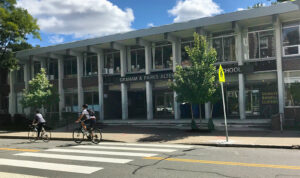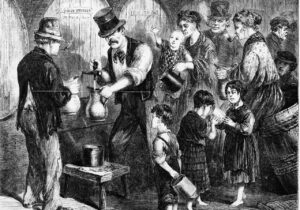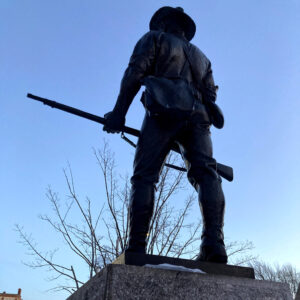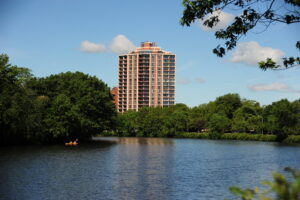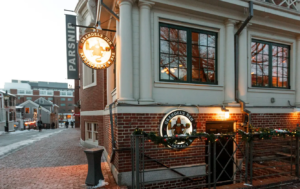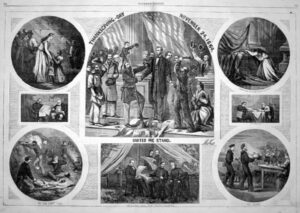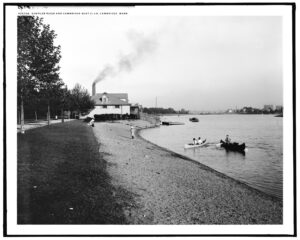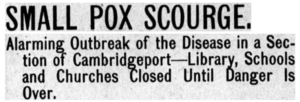What is in a name? The origins of Cambridge Public Elementary Schools’ Nomenclature
The Cambridge Public Schools website lists four early childhood education programs, twelve elementary schools, five upper schools, and three high schools. Each of these schools has its own rich history of how it came to be what and where it is today. Below, we will explore the origins of the names of Cambridge’s twelve elementary schools.
Read MoreFrom Papists to Patriots: St. Patrick’s Day in Cambridge
In the 1840s and 1850s, as a blight on the potato crop left millions of Irish in dire straits, the Cambridge press shared detailed descriptions of their suffering and implored readers to donate to a growing number of relief societies to aid the starving Irish abroad. As the famine reached its peak in the late 1840s, waves of rural Irish arrived in Massachusetts and settled in Boston, Cambridge, and surrounding communities. By 1855, 22% of adults in East Cambridge reported having been born in Ireland, and Irish immigrants made up a sizeable portion of the workforce in the city’s clay pits, brickyards, and glass and furniture factories.[1] Although Cambridge was a welcome respite from their suffering at home, Irish immigrants were not uniformly embraced in their new city; as poor, foreign-tongued newcomers – and especially as Roman Catholics – they were often stereotyped, criticized, and even shunned by white Cantabrigians who considered themselves natives.
Read MoreThe ‘Hiker’ statue is monumental miseducation about Filipinos in Cambridge and 51 other cities
There may not be many Filipinos in Cambridge – as a Harvard student, I am one of the few – but it seems that the Philippines mattered enough to the community to place a monument about my country of birth on Arsenal Square, at Garden Street and Concord Avenue in Neighborhood 9.
Read MoreHistory Cambridge will bring an art installation to Brattle Street to focus on neglected Black past
History Cambridge intends to install temporary public art this spring on the front lawn of the Hooper-Lee-Nichols House, 159 Brattle St., to raise awareness of Black history in West Cambridge. The organization seeks an artist who works or lives in Massachusetts and is sensitive to the connected history of Massachusetts and plantations in the Caribbean to create a site-specific, temporary piece of installation art. Funding comes from Cambridge Arts and the Massachusetts Cultural Council.
Read MoreTeens will spotlight neighborhood features thorough a project by CRLS’ Jennat Jounaidi
My name is Jennat Jounaidi, a 10th-grader at Cambridge Rindge and Latin School who has lived in Cambridge all my life, and I am elated to be this year’s History Cambridge fellow. My interests include history and politics (and, in my free time, cooking and baking), and the goal for this semester is to help connect the history of Cambridge with issues affecting the city’s teenage and young adult residents.
Read MoreA Brief History of “Ten Ten”
By Elizabeth af Jochnick Before Ten Ten was Ten Ten, it was an in-patient infirmary for Harvard students, located next to Mount Auburn Hospital, known as the Stillman Infirmatory. When the University moved its student health facilities to Harvard Square, they put the Infirmary up for sale. Harvard offered to sell the building and the…
Read MoreGrendel’s Den: 50 years of Stories to Tell
By Daniel Berger-Jones, Company Leader, President, Cambridge Historical Tours, Inc., 2021 Grendel’s Den is one of the most iconically Cantabrigian bars there is. Founded in 1971 by Herb and Sue Kuelzer, it’s now on its second generation of family ownership in the hands of their daughter Kari. And at 50 years old, the bar is…
Read MoreThanksgiving in Civil War Cambridge
By Beth Folsom, 2021 From the beginnings of English settlement in the American colonies, both religious and secular leaders called for certain days to be set aside for fasting, prayer and thanksgiving, usually aligned with the change in seasons and their accompanying times of planting and harvesting. The earliest settlers to arrive in Massachusetts brought…
Read MoreA Lost Park: Longfellow’s Parklands
By Annette LaMond | S.M., MIT Sloan School of Management | Ph.D., Yale University There are various lenses through which to view the history of a city, and the treatment of open space and development of parks may be as revealing as any other. This is particularly true in Cambridge – one of the most…
Read MoreCambridge and the Smallpox Epidemic, 1893-1903
By Beth Folsom, 2021 In our current era of COVID-19, heated discussions of vaccine mandates and the class and racial tensions inherent in these conversations may seem like a contemporary dilema, but an examination of Cambridge at the turn of the 20th century reveals that the city engaged in similar debates around the issue of…
Read More
